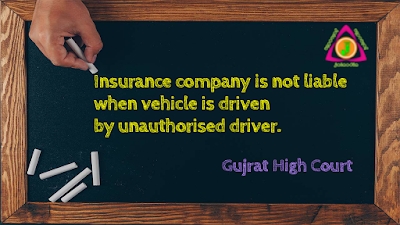The entire facts and circumstances raises a doubt in the mind of the Court. As far as the accident claims are concerned, the facts must be unambiguous.
Showing posts with label insurance. Show all posts
Showing posts with label insurance. Show all posts
24 September 2020
If charge sheet is not corroborating with the facts stated in the Motor Vehicle Accident Claim Petition, then the Tribunal should not considered the Claim Petition at all
Both the above provisions of the Motor Vehicles Act, 1988 unambiguously reveals that the Police officer, on receipt of information regarding any accident involving death or bodily injured to any person, has to register the F.I.R and conduct investigation and submit a report and such a report is to be communicated to the Claims Tribunal as well as the insurer and the copy should be made available to the owner of the vehicle also. The above statutory provisions is crystal clear that the duty of the Police officer to prepare the Accident Information Report and the detailed accident report and communicate the report to the Tribunal and Insurance company and thereafter, the Claims Tribunal under Section 166(4) of the Act shall treat the report of Accidents forwarded to the Tribunal as an application under Sub-Section (6) of Section 158 for compensation under the Motor Vehicles Act.[Para No.15]
10 August 2020
Insurance company is not liable to pay compensation to the claimants if cheque of premium issued by vehicle-owner is dishonored before the date of accident
On perusal of the entire record, it is not in dispute that respondent No.6, owner of the offending vehicle, has issued the cheque on 28.02.2014 for Rs.42,335/- towards payment of premium in respect of the offending vehicle. Pursuant to the same, the Insurer has issued a cover note on the very same day. The Insurer deposited the said cheque with its banker on 10.03.2014 for encashment, but the same was dishonoured on 11.03.2014. The same was informed to the Insurer vide cheque return memo dated 11.03.2014. Thereafter, the Insurer has addressed Ex.B5 - letter dated 13.03.2014 to the owner by sending the same through registered post with acknowledgment due to the address furnished by the owner while issuing Ex.B1 - cover note. A copy of Ex.B5 was marked to the RTO informing about the dishonour of cheque as well as cancellation of cover note. The said letter was received by the owner vide Ex.B6, while the RTO under Ex.B7. In Ex.B6 - postal acknowledgment card, there is a signature in proof of receipt of Ex.B5 - letter. It further discloses that the article was booked vide RLAD No.RM838996406IN. The learned counsel for the claimants would contend that signature on Ex.B6 does not belong to respondent No.6 and, therefore, he has not received Ex.B5 - letter. But, the said contention cannot be accepted in view of Exs.B1, B5 and B6. Admittedly, Ex.B5 was sent to the address furnished by the owner under Ex.B1.[Para No.26]
From the above discussion, it is clear that the cheque issued under Ex.B2 was dishonoured and consequently Ex.B1, cover-note was cancelled by the Insurer. The Insurer also intimated about the dishonour of cheque as well as cancellation of policy to the owner as well as RTO by addressing a letter under Ex.B5 and the said letter was received by the owner under Ex.B6 while Ex.B7 discloses receipt of Ex.B5 letter by the RTO. Thus, there is no valid policy exists as on the date of accident i.e., 04.05.2014. Section 64-VB of the Insurance Act also says that no risk to be assumed unless premium is received in advance. In the present case, the Insurer has not received the premium and, therefore, the Insurer shall not assume any risk. As such, the Insurer is not liable to pay compensation to the claimants - legal heirs of the deceased. [Para No.31]
As already discussed above, the accident is not in dispute. The claim was under Section 163A of the M.V. Act.
01 May 2020
Insurance company not liable when vehicle is driven by unauthorized driver
Motor Vehicle Accident Petition - Sec. 165, 168, 174, 149(2) of The Motor Vehicle Act - Accident by unauthorized driver - breach of policy - liability of Insurance Company
 Mere producing of valid insurance certificate, in respect of offending truck is not enough for the owner to make insurance company liable to discharge liability arising from rash and negligent driving by the driver of the vehicle. The insurance company can be fastened with the liability on the basis of the valid insurance policy only after basic facts are pleaded and established that the vehicle was not only duly insured but also that it was driven by anauthorized person having a valid driving license. The insurance company would become liable only after such foundational facts are pleaded and proved by the other side.
Mere producing of valid insurance certificate, in respect of offending truck is not enough for the owner to make insurance company liable to discharge liability arising from rash and negligent driving by the driver of the vehicle. The insurance company can be fastened with the liability on the basis of the valid insurance policy only after basic facts are pleaded and established that the vehicle was not only duly insured but also that it was driven by anauthorized person having a valid driving license. The insurance company would become liable only after such foundational facts are pleaded and proved by the other side.
Legal words:
accident,
breach of policy,
civil,
compensation,
high court,
insurance,
pay and recover
Subscribe to:
Posts (Atom)


